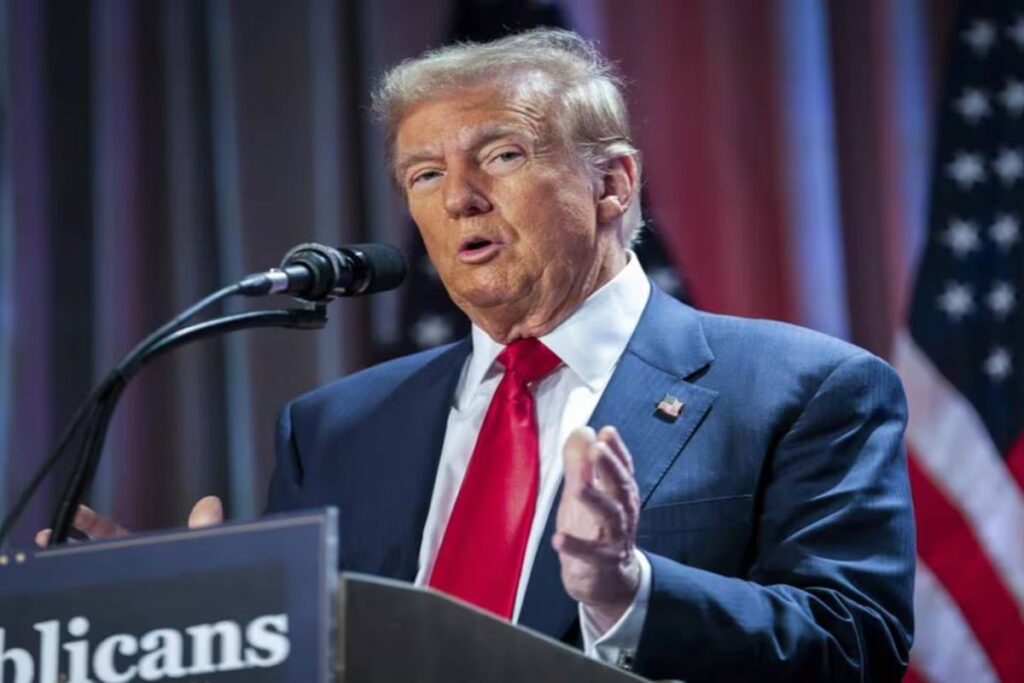The U.S. job market is feeling the heat as President Donald Trump’s latest tariff moves rattle Wall Street and spark uncertainty nationwide. Just weeks into his second term, Trump’s 25% tariffs on Canada and Mexico, plus a 10% levy on Chinese goods, have flipped the script on the “Trump bump” that once fueled hiring optimism.
While investors flee risk and stocks slide, experts are buzzing about what this means for recruitment trends, career advice, and industry-specific job roles in 2025. Are jobs on the chopping block, or could this spark a hiring boom in unexpected corners? Let’s dive into the chaos and see what’s at stake for American workers.
Tariffs Derail the Trump Job Hype
Remember the post-election glow? Back in November, markets soared over 7% by mid-February, betting big on Trump’s pro-growth agenda of deregulation and tax cuts. CEOs were jazzed, too—56% planned mergers and acquisitions (M&A) through 2025, up from 37% last fall, per the EY Parthenon CEO Outlook Survey. The Trump tariffs job market outlook was rosy, with financials, crypto, and small-cap stocks riding high on promises of a business-friendly White House.
Read Also: UT Austin Shocker: Interim President Ousts Provost in Bold Shift
Fast forward two months, and that vibe’s taken a hit. The S&P 500’s sinking deeper into the red, and Trump’s sudden protectionist pivot—think on-again-off-again tariffs on Canada and Mexico—has investors spooked. “The market’s grappling with macro-uncertainty,” says Michael Reynolds, VP of investment strategy at Glenmede. “An extreme tariff scenario could wipe out GDP gains from deregulation.” For job seekers and employers, this flip-flop means the hiring trends everyone banked on might not pan out as planned.
Why the Job Market’s on Edge
So, what’s got the job market jittery? Tariffs aren’t just trade talk—they’re a wrench in the works for companies plotting growth. Take the IPO scene: Goldman Sachs predicted a “supercycle” of new listings, but JPMorgan’s January note found zero evidence of a Trump-driven spike. “C-suites are holding off on big moves like IPOs or M&A until they know what trade terms look like,” Reynolds told Business Insider. That hesitation could stall hiring plans, leaving job seekers in limbo.
Then there’s the deregulation delay. Trump’s team promised to slash red tape, but 50 days in, the pace is sluggish. “Review processes take time,” Reynolds says. “We’re not seeing new regs, which is a breather, but the big cuts aren’t here yet.” Without that boost, the Trump tariffs job market impact feels more like a waiting game—great for career advice gurus telling folks to “hold tight,” but tough on workers needing gigs now.
Winners in the Tariff Storm
Not everyone’s sweating, though. Some industry-specific job roles could thrive under Trump’s trade shake-up. Experts like David Bianco, Americas CIO at DWS Group, see tariffs nudging companies to “reshore” operations to the U.S. Think manufacturing hubs like Kentucky and Tennessee, where auto giants like Ford are already building plants. “Tariffs make a compelling case to move production stateside,” says Samuel Rines, macro strategist at WisdomTree. That’s a green light for factory workers, machinists, and logistics pros eyeing career opportunities in 2025.

Financials are another bright spot. Banks—especially regional ones—don’t rely on imports, so they’re insulated from tariff hikes. “They’ll get a double boost from deregulation and lower corporate taxes,” says Clayton Gardner, co-CEO of Titan wealth management. Picture loan officers, financial analysts, and bank tellers seeing more action as cash flows freer.
And don’t sleep on “good old-fashioned American businesses”—grocery stores, dollar chains, home builders, and small airlines. Gardner calls them “low-margin winners” that’ll cash in on domestic demand without global supply chain woes.
Tech’s got its own shield, too. Software, cloud services, and digital platforms—like SaaS firms or social media giants—sidestep physical goods headaches. “They’re not worried about tariffs,” Bianco notes. For IT pros, coders, and digital marketers, that’s a signal to polish those resumes—hiring tips for 2025 say these roles could stay hot.
Losers Feeling the Pinch
Flip the coin, and it’s a different story. Companies with international supply chains—like big S&P 500 multinationals—are in the crosshairs. Tariffs jack up costs for imported parts, squeezing margins and potentially axing jobs. “Think manufacturers reliant on Canadian steel or Mexican auto parts,” Rines says. Assembly line workers, supply chain managers, and procurement specialists might face layoffs if firms cut back.
Export-heavy sectors are sweating, too. If Canada and Mexico slap retaliatory tariffs—as they’ve hinted—U.S. exporters could lose ground. Farmers, aerospace workers, and machinery operators might see orders dry up, denting recruitment trends in those fields. And don’t forget the IPO hopefuls—startups stalling launches mean fewer openings for accountants, marketers, and execs banking on that “supercycle.”
Deregulation: The Wild Card for Jobs
Here’s the twist: deregulation could still save the day. Trump’s first term saw modest job bumps—like 1,800 new roles at Whirlpool, Samsung, and LG plants after washing machine tariffs. This time, he’s eyeing bigger cuts, like axing 10 rules for every new one. “That hyper-deregulation could spark investment,” says a Bank of America note. Small-cap firms—think regional manufacturers or retailers—stand to gain most, potentially hiring factory hands, sales reps, and managers once the red tape clears.
But timing’s everything. “We’re only 50 days in,” Reynolds reminds us. “The boost might not hit ‘til later this year.” For now, career advice 2025 is all about patience—job seekers might need to ride out the tariff storm before deregulation hiring trends kick in.
What It Means for Job Seekers
So, where does this leave you if you’re hunting for work? First, know your industry. If you’re in manufacturing or finance, Trump’s tariffs could open doors—brush up on industry-specific job roles like CNC machining or financial advising. But if you’re tied to global supply chains, say in logistics or export sales, diversify your skills. “Flexibility’s key,” Gardner advises. “Look at domestic-focused firms—they’re less rattled.”

Second, timing’s your friend. Deregulation’s lag means spring or summer might bring a hiring wave. “Polish your LinkedIn now,” Rines suggests. “Companies reshoring later this year will need talent fast.” Check out hiring tips for 2025—networking and upskilling could give you an edge when the dust settles.
Employers: Navigating the Chaos
For bosses, it’s a mixed bag. Tariffs might nudge you to hire locally—great for boosting U.S. jobs—but higher costs could strain budgets. “Analyze your supply chain,” Bianco urges. “If you’re import-heavy, brace for leaner headcounts.” On the flip side, deregulation could free up cash for expansion. “Plan for a late-year push,” Reynolds says. “Small firms especially could see a hiring spree once rules loosen.”
The Bigger Picture: Jobs in Flux
Zoom out, and the Trump tariffs job market story’s still unfolding. The Tax Foundation pegs tariff costs at $1,072 per household annually—could that dampen consumer spending and slow hiring? Maybe. But reshoring and tax cuts could offset it, pumping 223,000 jobs back long-term, per some estimates. “It’s a trade-off,” Rines says. “Short-term pain for potential gain.”
Context matters, too. The U.S. has shed 6.8 million goods-producing jobs since 1979 as services took over. Tariffs might claw some back, but automation’s a bigger hurdle. “Higher-end manufacturing—like chips for AI—could thrive,” Rines adds, pointing to the CHIPS Act’s momentum. That’s a lifeline for engineers and techies.
Your Take: Boom or Bust?
This tariff rollercoaster’s got us all guessing—what’s your read on the Trump tariffs job market shake-up? Are you a job seeker eyeing new gigs in manufacturing or finance? Or an employer rethinking hiring plans? Drop your thoughts in the comments—let’s hash out if this is a bust or a boom waiting to happen. Share this on social to keep the convo going, and check our career advice 2025 hub for more tips!
Read Also: White Collar Recession 2025: Tech Layoffs Reshape Jobs and the Future
Wrapping Up: A Job Market in Transition
As of March 08, 2025, Trump’s tariff moves are rewriting the job market playbook. While stocks stumble and uncertainty reigns, winners like manufacturers and banks could spark hiring trends, even as global players brace for cuts. Deregulation’s delay keeps us on edge, but the promise of a pro-growth push lingers. For workers and employers, it’s adapt-or-wait time—2025’s job landscape is anyone’s game.

